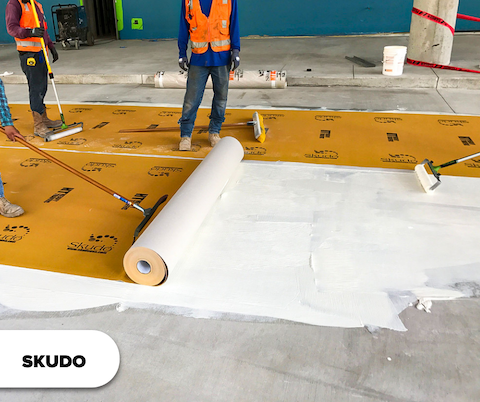Floor Protection and It’s Importance
At T.W. Hicks we write in an option for temporary floor protection with every proposal, however industrial floor protection is extremely underutilized within our industry and is often ignored. It is an overlooked step that is so much more important than most realize. We can provide you with a floor that looks like a million bucks, but without properly protecting the finished floor throughout construction, you are left with a damaged floor.
When it comes to industrial floor protection, the number one thing we believe everyone should know is that something is always better than nothing at all. Going without any protection can cause major issues, that will need to be repaired. Repairing the floor comes with hefty cost and is especially painful to pay for when it could have been avoided. Whether it’s a new construction site or a renovation project, there is a need to protect your floors and T.W. Hicks has you covered!
As an industrial flooring company, with 22 years of experience in the industry, we know first-hand the importance of floor protection. However, we also understand how costly this addition can be for the entirety of the floor. Especially, in many of the buildings we work in that are thousands of square feet! In these situations, we recommend that customers should consider at least protecting designated areas such as walkways, machinery paths for other construction trades, etc. The flooring protection costs are a fraction of the cost of the flooring systems we provide, without any form of protection, you will find yourself paying double to triple what you anticipated originally on repairs and recoating!
Industrial floor protection options and what we recommend:
Masonite
This is one of the most common materials used for temporary floor protection. Masonite is an inexpensive sheet of pressed-wood fiberboard that is tape down to the floor. It is considered to be suitable for all floor types and is known for its impact protection and pressure resistance. However, we no longer recommend using this product due to several recurring problems we have seen on the jobsite.
Discoloration: Masonite is not a sealed or coated product, therefore if it gets wet, it will penetrate through the underlayment and stain the floor with a light brown color.
Scratches: Masonite is a very rigid board that lays loosely atop of the floor. This can cause minor scratching, but if dirt, rocks, nails, or any other hard material were to get trapped under the board it will grind and scratch the flooring.
Movement: It’s common for Masonite to be secured using duct tape. However, duct tape will not provide the necessary strength for proper adhesion. Resulting in movement of the Masonite and even residue from the duct tape.
Ram Board
Ram Board is a heavy-duty temporary floor protection known for its ability to stand up to scaffolding and heavy equipment. In fact, we have used this product many times at T.W. Hicks. One of the benefits Ram Board offers is the patented technology, Spill Guard and Vapor Cure, that get rid of cure lines and protect the floor while it cures. Ram Board is rolled out across the floor and has specific clean release tape for seams and edges to prevent spills from ever reaching your floors.
Similar to the Masonite, Ram Board is applied with tape. Ram Board’s tape is clean release, so left over residue isn’t typically a problem. However, we have found that heavy-duty machinery, such as forklifts or scissor lifts, often snag or tear the board.
Skudo
Skudo is one of the newest and most innovative temporary surface protection lines we have seen on the market. They offer a variety of products for floors, walls, and doors. We are eager to put Skudo products to the test and see how it compares to Masonite and Ram Board. Unlike their competitors, Skudo is not taped down or loosely laid.
The Skudo Commercial System includes two components: base coat and mat. The commercial mat is pressed into the water-based liquid base coat to create a heavy-duty, slip resistant barrier that adheres to your protected work surface. Then, simply peels off with the mats upon removal. The strong adhesion method prevents dirt, debris, and grime from contaminating your floor, wall, or door. Ensuring your surface is clean and free of damage once the temporary floor protection is removed. Additionally, the Skudo (Heavy Traffic) Mat is slip-resistant and reduces the risk of equipment snagging as well as protects against water, mold, spills, and stains (including paint, mortar, and mild solvents), as well as UV exposure, sparks, and fire.
The contractors at T.W. Hicks are highly skilled in all aspects of industrial floor protection. You would be hard-pressed to find a better crew to get the job done. Don’t hesitate to give us a call for any of your industrial flooring needs.



